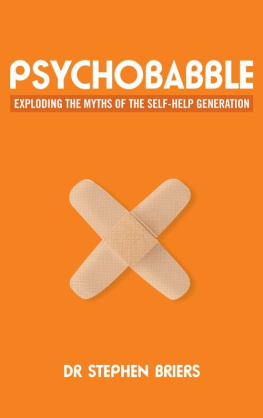Contents
Introduction
Welcome to your exclusive eBook of the best chapters from the Brilliant series. Whether youve bought one of the 1.5 million Brilliant books that have been sold around the world or not, weve included 10 chapters from 10 of our bestselling Brilliant books to give you a little taste of the series, and hopefully motivate you to read more! By choosing the most inspiring and useful chapter for you, we hope youll learn something new and get one step closer to being Brilliant on your chosen subject.
Brilliant books are completely designed with you in mind. We start with the basics and work on giving you what you need to know, exactly when you need it. Scattered throughout the chapters youll find learning features to help strengthen your knowledge:
Brilliant tips
Brilliant definitions
Brilliant dos and donts
Brilliant action points
Brilliant recaps
Brilliant now has 150 titles available in the business, management, lifeskills, computing, teaching and study skills areas, so if you need help, advice or inspiration well have something for all your personal and professional needs.
PART 1
LIFE
Our life titles cover all kinds of personal development topics to help you feel inspired and achieve what you want.
This section includes chapters on cognitive behavioural therapy, neuro-linguistic programming (NLP), body language, self confidence and memory training.
So, if you want to:
- Learn how to avoid common thinking traps using cognitive behavioural therapy
- Use NLP to think your way to feeling great
- Understand the rules of body language and attraction
- Improve your confidence at home and work
- Find out the secrets to remembering names and numbers
... then read on!
T he philosopher Socrates was sitting outside the city gates of Athens when a man comes up to him. The man says: I am thinking of moving to Athens. What is it like living here? Socrates looks up and asks him: I would gladly tell you but answer me one question: what is it like where you live now? The man replied: Terrible! The people are back-stabbers and thieves. I will be leaving no friends behind me only enemies. Socrates frowned and replied, Well, you had best be on your way because you will only find the same thing here in Athens.
Later a second man approached who was also considering moving to Athens. Once again the old philosopher asked him about his experience of his home town. The man smiled and said, Where I come from the people all work together and help each other. Kindness is everywhere and you are always treated with respect. Welcome to Athens, smiled Socrates, you will find the same thing here.
Socrates knew that our mindset determines our experience of the world and he recognised that both men would carry their habitual attitudes, perceptions and ways of interacting with them. It was the way they processed information and biases in their thinking that were likely to dictate the quality of their lives just as much as the nature of their surroundings.
In order to escape from the mental prisons that we can so easily build for ourselves, CBT insists that we first need to become more aware of the biases in our thinking that can keep us trapped and unhappy. In this chapter we shall examine some of the most common thinking traps and help you become more aware of the ways in which they can perpetuate our difficulties. You will be given the opportunity to analyse your own thinking style and learn simple strategies for avoiding common thinking errors.
Thinking error 1: catastrophising
The end of the world is nigh!
I cant find my purse Oh no! I must have left it in the supermarket Someone is sure to have nicked it Maybe it was stolen by someone who was looking over my shoulder when I got the money out of the cash dispenser in which case they know my PIN number and will probably already have emptied my bank account or stolen my identity That means I wont be able to pay my bills this month What if the bank decides to repossess the house? Well be ruined. Were going to end up out on the street How could I have been so stupid?
We all know people who think like this. Catastrophising is the hallmark of an anxious person. It combines pessimism (i.e. assuming that in any situation a bad or distressing outcome is more likely than a good one) with a wildly exaggerated sense of threat. Things will not only be bad. They will be really bad.
Unfortunately people who catastrophise find it hard to appraise the significance of a situation realistically: they can end up becoming just as distressed by relatively trivial setbacks as a major misfortune. They constantly project themselves into a doom-laden future and allow their imaginations to run riot with frightening scenarios.
People who catastrophise seldom take into account any resources they might have to deal with the worst-case scenario. If this is you ask yourself:
- On the scale of all the bad things that have happened in the past or could happen to you in the future, how bad could this event be?
- If I had no choice but to deal with the very worst thing that could happen in this situation what would I actually do?
- Think about how you may have dealt with other past difficulties. What helped you then?
Thinking error 2: generalisation
Things always go wrong for me
Human beings are drawn to patterns. We frequently use our experience as a template for our predictions about the future. However, people who are inclined to generalise require little evidence in order to deduce laws and assumptions about the way the world works and invariably their observations and deductions are pretty downbeat. A man loses a game of Scrabble and thinks to himself Typical! I never win at anything. A young girl gets teased at school and concludes, Everyone hates me! An elderly lady reads about a mugging in the local paper and ruefully concludes that No one is safe these days. All of these are examples of generalisation in which an individual draws some far-reaching, universal conclusion on the basis of a single unpleasant experience or discrete piece of information.
The language of people prone to generalisation is usually a reliable giveaway. If you hear yourself using absolute terms like never , always , everyone and no one a lot, then the chances are you may be vulnerable to this type of thinking.
In order to counter generalisation you need to train yourself to look for exceptions to your own rules. If you have one friend in the world then it is not the case that no one likes you and it is highly unlikely you have never won at anything even if your distorted thinking probably makes it hard for you to bring any past victories to mind. The danger with generalisations is that we tend to screen out anything that does not correspond with our ill-founded convictions, whereas we eagerly seize upon fresh evidence that appears to support our negative beliefs about ourselves and others.
Unfortunately, generalisations easily become self-fulfilling prophecies. For example, someone who believes she is universally unpopular will make little effort to make herself amenable to other people.
Thinking error 3: mind reading
She thinks I am an idiot
We make assumptions about other people and their intentions all the time. To some extent this is necessary, and we can reliably infer a great deal from peoples actions and past behaviour towards us. However, in some circumstances our imaginations run riot. We leap to conclusions about other peoples motives and attitudes on the basis of very little hard evidence. We are especially inclined to do this when those motives and attitudes affect us directly.









